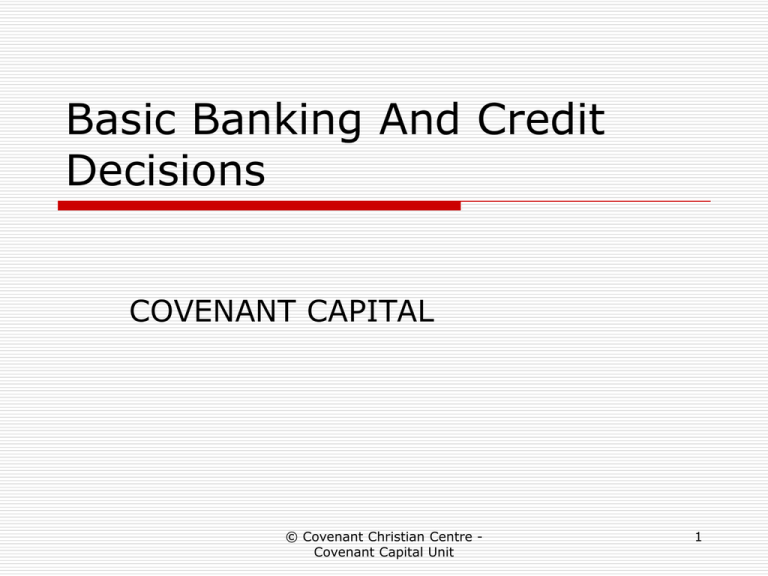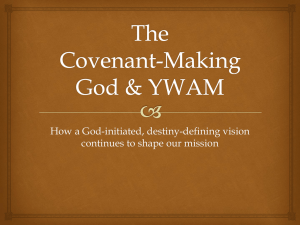Basic-Banking-And-Credit-Decisions
advertisement

Basic Banking And Credit Decisions COVENANT CAPITAL © Covenant Christian Centre Covenant Capital Unit 1 Course Goals Why develop a banking culture? Types of banking accounts and how businesses should determine their account choice type. Financial Management, raising Capital and what lenders look for. How credit works and the cost of loan. © Covenant Christian Centre Covenant Capital Unit 2 They help keep your daily financial records which serves as a point of reference for potential lenders or business partners. They help secure your cash They could assist in funding your business Some banks provide financial advisory services The key is finding the bank that's right for you, with the right combination of products, services, costs and convenience. But one basic thing you should have in your mind is that banks are profit-making institutions. © Covenant Christian Centre Covenant Capital Unit 3 A Range of Bank Services When you use a bank, you receive regular statements that tell you how much you have in your accounts, what bills you've paid, and how much interest you've earned. You may qualify for a credit card. If you need money to rent a home or to expand your business, you can apply for a loan. And if you're ready to invest, you can do that through a bank too. Banks provide detailed information about the accounts they offer, which they update each time they make a change. Visiting the local branch office of a bank or their website should provide you with a good overview on what products and services they offer, along with their costs. © Covenant Christian Centre Covenant Capital Unit 4 Keep track of your accounts by checking the monthly statements you receive. You'll want to compare the bank's record with your own records to be sure all the transactions recorded tally. If you have a loan, you are responsible for making payments on time. Ensure that you understand the features of the products you are buying © Covenant Christian Centre Covenant Capital Unit 5 The unbanked are people and businesses that have up to 50% of their cash transactions not routed through a bank. The disadvantage of falling into this category is that the bank will always underestimate your capacity as an entrepreneur and this is very important to their partnering with your business goals. If you are ever thinking of getting any financial assistance for your business growth, jump out of this bus with the speed of light. © Covenant Christian Centre Covenant Capital Unit 6 Financial Management No matter how good your product or service, or how effective your marketing is, if you don’t have good financial controls in place, your business is far less likely to succeed than one that runs its finances well. That’s because you can usually project your expenses, or what you will have to pay out, but cannot always predict your revenue, or the money you have coming in. Carefully monitoring your expenses, as you do with a household budget or personal checking account, should be one of your primary concerns as a business owner. © Covenant Christian Centre Covenant Capital Unit 7 Raising Capital Many businesses fail, often within the first two years, for one simple reason: they are undercapitalized, or simply have not obtained enough money to get their business started or make it through some rough patches. So raising enough money, or capital, to start, maintain or expand your business is always a top priority. The major issue with capital is that most entrepreneurs are usually very optimistic and always fail to consider every aspect of cash involvement before venturing into business. You need to factor all your personal ‘’hygiene’’ cost also……. (Na power dem take dey blow fire) One rule of thumb is that when you start a business, you should have enough cash on hand to operate it for a year. And you should have enough to pay yourself a salary. If you don’t have income from your business, you won’t be able to pay your personal bills. © Covenant Christian Centre Covenant Capital Unit 8 If you borrowed part of your capital, paying back counts, too If you have to pay back too much of the capital you’ve raised within a short time, or if the interest you’re paying on the amount you borrow is very high, you may find that too much of your money is going to repay the loan rather than keeping your business going. If you are borrowing part of your capital, always consider the moratorium period and also the entire repayment plan. Always remember that the cash conversion cycle of every business differs… if u take a square loan for a round business, be ready to meet me in EFCC… © Covenant Christian Centre Covenant Capital Unit 9 What lenders look for 1) CHARACTER 2) CAPACITY 3) CAPITAL/CASH 4) COLLATERAL 5) CONDITION © Covenant Christian Centre Covenant Capital Unit 10 For most people, using credit is an essential part of daily life. You might already use credit — through credit cards or a loan — without knowing exactly how it works. While it's easy to do that, you'll want to learn as much as you can regarding this very important subject. Credit, or the ability to borrow money, can be a powerful tool in reaching your financial goals. Or, it can be a hidden enemy for those who do not have a spending plan or do not develop and maintain responsible credit management behaviours and skills. © Covenant Christian Centre Covenant Capital Unit 11 Most times, a lot of people apply for credits without really knowing why they need it. Basically, a credit could be obtained; 1. To finance fixed asset 2. To breach the gap between sales and actual payments. 3. To increase working capital; this should only be taken when the entrepreneur has observed that more capital is directly proportional to an increased percentage in income. Else, the cost of the loan might just wreck the business. © Covenant Christian Centre Covenant Capital Unit 12 How credit works Chances are you're familiar with credit. It's a convenient way to make purchases — from small, regular ones like groceries to large, unique ones like homes or cars. But you may not be sure what happens when you use a credit card or take a loan, the two most common examples of using credit. Learning more can help you cut costs and avoid using more credit than you can afford. For regular business, it is better never to exceed the 1:1 credit/equity ratio… There are definitely exceptions to this. © Covenant Christian Centre Covenant Capital Unit 13 The cost of using credit When you use credit, you're borrowing someone else's money. You agree to pay it back at a certain time, or on a certain schedule. And for the convenience of having someone else's money available when you need it, you pay a fee. That fee is known as interest and is usually charged as a percentage of what you borrowed. That means the more you borrow, the more you'll have to pay in interest. What borrowing will cost you is also affected by how long it takes to pay the money back. © Covenant Christian Centre Covenant Capital Unit 14 Paying on time With most types of credit, you agree to make payments on a certain schedule, and if you're late or don't pay what's due, you'll have to pay a penalty or late fee. That makes borrowing more expensive. If you have trouble repaying, it's possible that you've borrowed more than you can afford, or perhaps your circumstances have changed. And if you ignore the problem, it will only get worse, as penalties and interest build due to late or missed payments. © Covenant Christian Centre Covenant Capital Unit 15 It probably seems natural that a potential lender would scrutinize your background and financial history before choosing to extend you credit. But you can be selective, too. It's important that you research the terms of the loan you're being offered, to make sure that the lender, its products, and its services also fit your needs. One of the best ways to weigh different loans is by comparing the cost of borrowing the money, which includes the interest rate you're offered and any fees the lender charges. A simple way to compare the combined cost of interest and fees is by checking out the loan's annual percentage rate (APR), which tells you the percentage of the principal you'll have to pay on a yearly basis for the privilege of borrowing. © Covenant Christian Centre Covenant Capital Unit 16 Comparing costs Shopping around might produce a lender who is willing to offer you a better deal. It can help to check with your bank or a lender you already have an account with, since they might offer better terms or a small discount to current customers. TIP 0% Interest ? What if you're offered an interest-free loan? That can be a really good deal, because you can pay for something over time without a finance charge. But you'll want to be careful you understand the terms. For example, with some interest-free loans you risk having to pay a substantial fee plus the accumulated interest if you're ever late with a payment — even if it arrives only a day or two after the due date. © Covenant Christian Centre Covenant Capital Unit 17 Truth in lending Every lender you're considering is legally required to give you the following information about your loan: 1) Upfront Finance Fees 2) Monthly Interest Rate From these two, you will have to determine your Annual percentage rate (APR),…. Always compare this rate to the profitability of your business. © Covenant Christian Centre Covenant Capital Unit 18 THANK YOU Questions…. © Covenant Christian Centre Covenant Capital Unit 19








